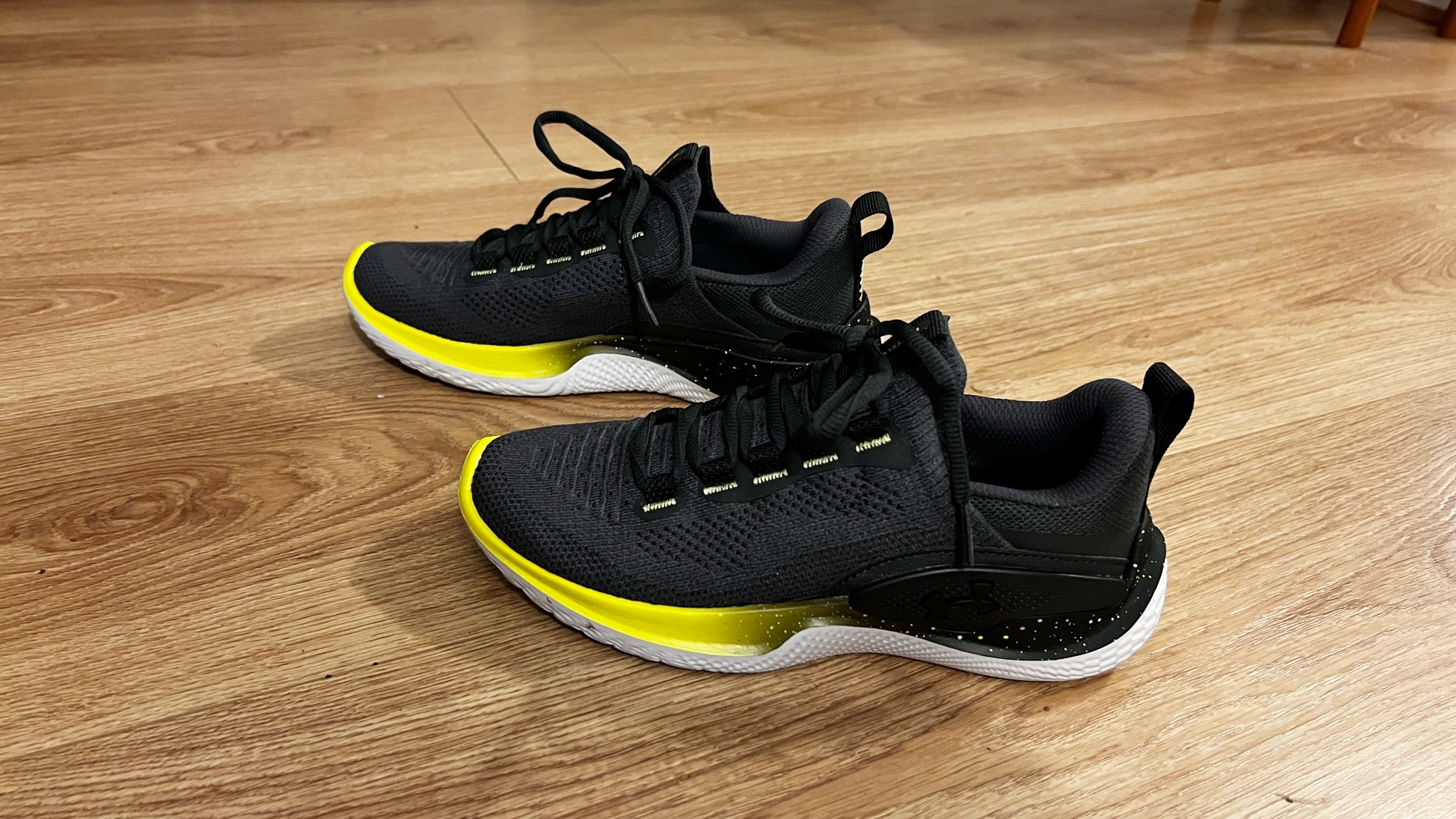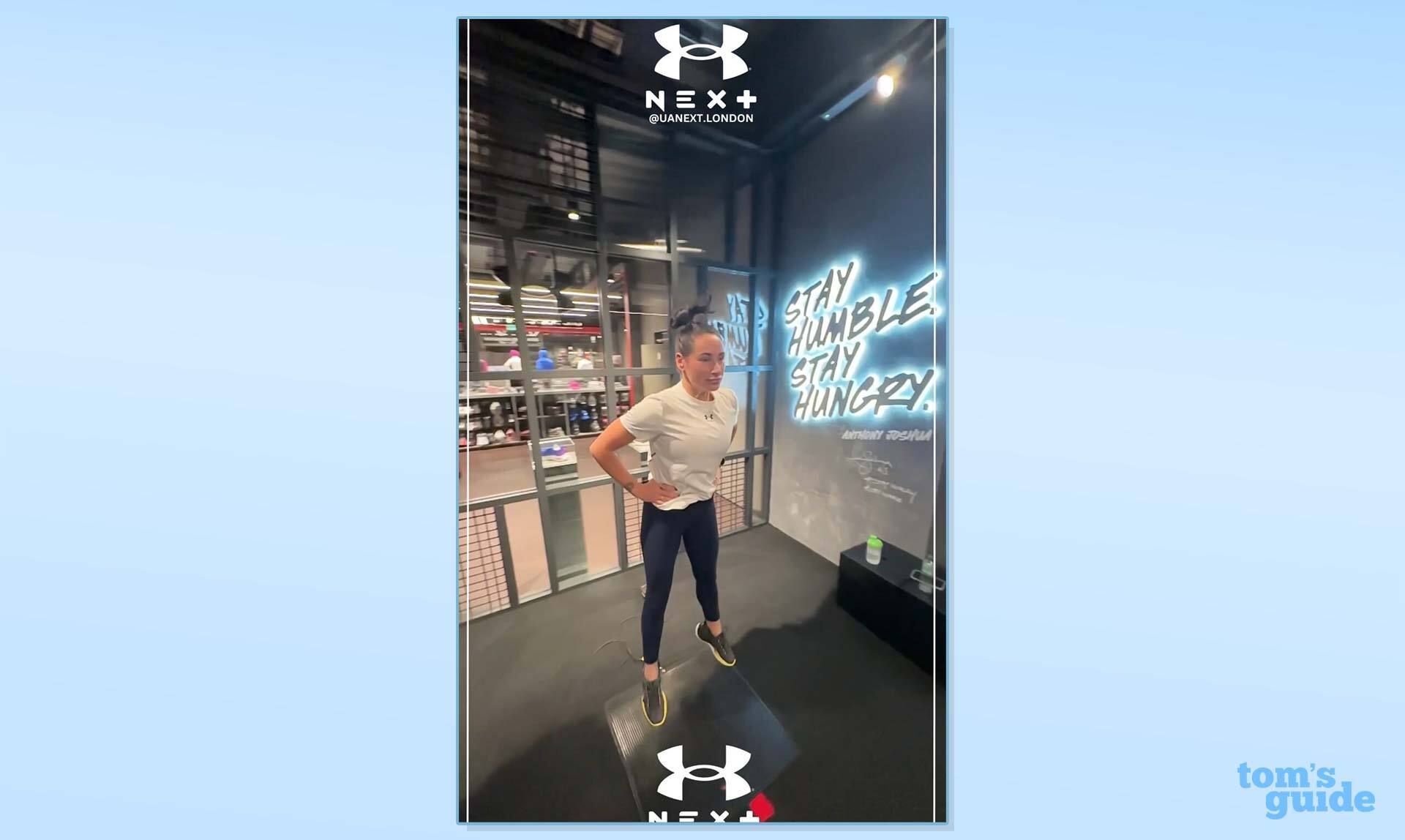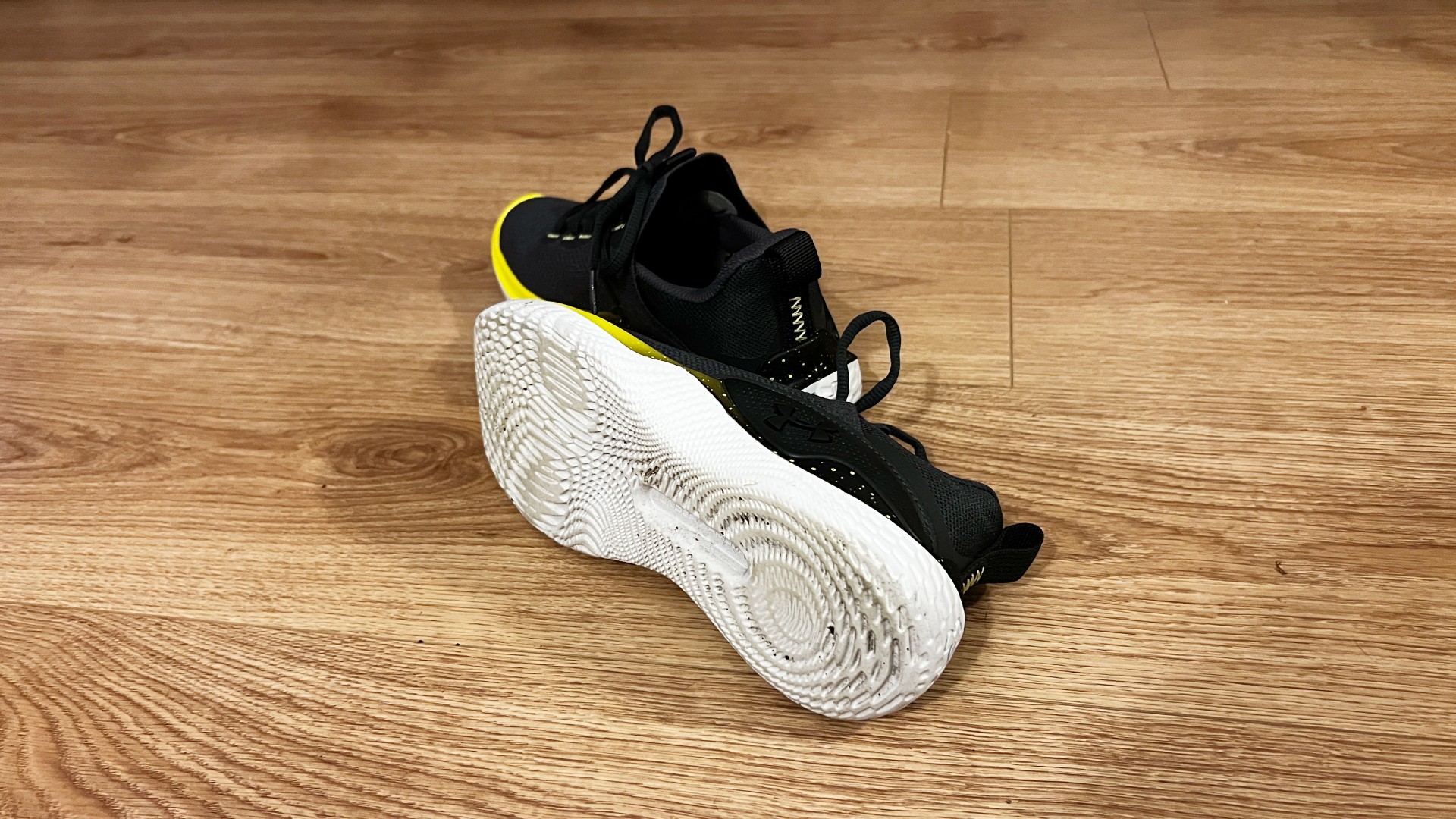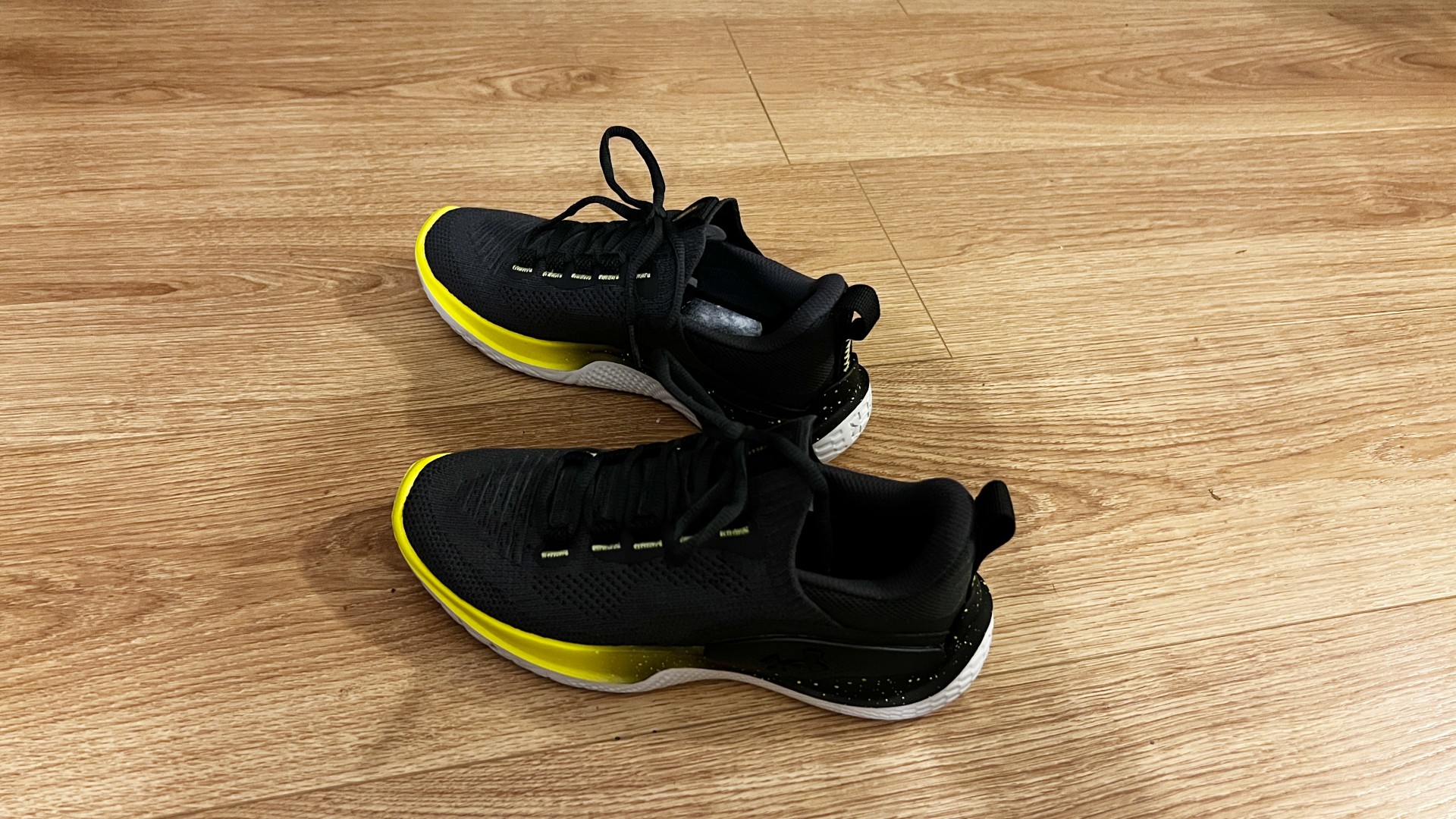
I wore the Under Armour Flow Dynamic training shoe to the UA Next academy, where the likes of Anthony Joshua have trained, to take part in six professional athletic tests — and here’s how the shoe fared.
If you haven’t heard of the UA Next academy before, Under Armour athlete Anthony Joshua unveiled the facility earlier this year in Spring 2023. The athletic program has been designed to ‘identify, train and develop’ young athletes between ages 16-20 by testing and training at the facility.
Keen to understand the hype around this shoe, I headed to the London-based facility to test the Under Armour Flow Dynamic training shoe myself, putting it through the paces with six athletic tests used in the program. Here’s what happened.
What is the Under Armour Flow Dynamic training shoe?
The Under Armour Flow Dynamic training shoe has been marketed by Under Armour as “One shoe. Every workout.” To an extent, sure, I can get on board with that. The high-tech slipper is the most comfortable training shoe I’ve stepped into for a long time — and I’m basically a Nike Metcon 9 cult member.
I’ve run a comfortable 5K and hit CrossFit workouts wearing them since testing, so if you’re packing light and need a training shoe that tackles sled pushes, treadmills, or agility work, this one fits the bill.
Given the choice, I’d still pick the Asics Gel-Nimbus 25 running shoe for a longer run or another pair of the best running shoes for extra cushioning and better energy return (there’s noticeably better cushioning in the forefoot than the heel). But I’ve chosen these training shoes over my Metcon 9 several times already — even during mid-weight strength training. They’re just so darn comfortable.
The UA Flow Dynamic training shoe has been designed for multi-faceted team sports athletes, bringing together the cushioning of running shoes and the grip and support of the best cross training shoes or weightlifting designs.
The training shoe retails at $130/ £115 direct from Under Armour in various colorways. These training shoes aren’t cheap, but they can replace several pairs in the gym if you like hybrid workouts.
I wore the Under Armour Flow Dynamic training shoes during 6 professional athletic tests — here’s how they fared
The six tests were developed by top sports scientists and “represent the six foundational areas that high-performing athletes need to master to maximize their game.” These include athletic intelligence, strength, power, speed, agility and endurance. Of the six tests I undertook, four were relevant to testing the Flow Dynamic training shoe, so here they are.
Power

To kick things off, several of us journalists lined up to take the power test. One by one, each of us approached a pad on the floor. We started with feet hip or shoulder-width apart and had to jump as high as possible while UA’s tech measured how long we spent in the air. You can bend your legs to jump, but your legs must be straight when you leave the ground.
The Flow Dynamic training shoe has an internal shank to support underfoot during explosive movements like jumping. The bouncy, lightweight sole gave a spring in my step as I jumped, and my ankles felt secure as I landed without losing stability. The soft sole absorbs impact without sacrificing power during the jump. It was a good start.
Speed

For our next test, we had to sprint between two sensors that could measure speed over a short track, testing explosive forward propulsion. Throughout, I found the rubberless soles gripped so well that I don’t think even a sweaty CrossFit floor could have taken me down.
I love that the slip-on design behaves like a well-thought-out bootie; these shoes encase the foot like one piece of material and offer seriously impressive traction underfoot. The UA IntelliKnit upper wraps the foot with the stretch and breathability that allows me to strike freely and run naturally, and it works for wider feet.
The midsole of the Flow Dynamic training shoe is plush and bouncy, with brilliant forefoot cushioning that has me reaching for them again and again. The built-in tongue may divide crowds, but I much prefer it. At no point did these training shoes feel unstable despite the slip-on design.
Agility
The agility test starts with the athlete standing opposite a sensor that turns green when it’s time to run. I had to run to my right and step my right foot over a line, then run to the left and do the same with my left foot, returning to the center position as fast as possible.
The lateral TPU wrap supports multi-directional movement, and I felt secure moving from side to side at speed. Despite the training shoe having a slipper-like feel, it doesn’t compromise on support, and you can tell the design process had the athlete in mind for multi-directional training. This test was one of my most successful rounds (I ranked second place), and the UA Flow Dynamic training shoe felt responsive at every step while securing the ankles during fast turns.
Endurance

Last up — the dreaded bleep test. The rules are simple enough — run from one line to one opposite after the first bleep and return before the third bleep. You must hit the second line before the second bleep.
I found the Flow Dynamic training shoe responsive enough during the endurance run, but I’m not convinced I’d wear them for more than a 5K. I love the one-piece Flow midsole lightweight cushioning, and I found the shoe responsive, but there are other brands I’d choose for serious running efforts — we’ve rounded up these Asics running shoes deals if you’re looking for a new pair.
Here's where the bootie-like design stepped up. I didn't experience any sore points, chaffing or rubbing like you might get with a pair of running shoes, instead, I felt connected with the ground, flexible and nimble as I ran.
Under Armour Flow Dynamic training shoe verdict
Since, testing, I’ve worn the UA Flow Dynamic training shoe during snatches, power cleans and jumping rope — and it excels. I found the shoe stable and supportive enough during the foot transfer of power cleans, and the 8mm drop provides a middle ground between high (weightlifting) and minimal offsets.
For heavier weightlifting, I’d opt for a shoe with a firmer heel and sole, like the Nike Metcons 8 or 9, or a traditional weightlifting shoe. We cover cross training vs weightlifting shoes if you’re unsure which model to choose. Granted, you won’t run any distances in the Metcon range (they don’t offer much bounce or cushioning), but you’ll be thankful for the stiffness when you lift.
The high-tech slipper is the most comfortable training shoe I’ve stepped into for a long time — and I’m basically a Nike Metcon 9 cult member.
The Under Armour Flow Dynamic training shoe from Under Armour markets as a hybrid shoe for runners and cross training, but I don’t think long-distance runners will commit to this shoe over Asics or Hoka. That said, the shoe delivers for cross training and smashed it during the Under Armour testing.
The mark of good training shoes is if I reach for them without thinking when I dive into the shoe cupboard — and I do with these, over and over again.







